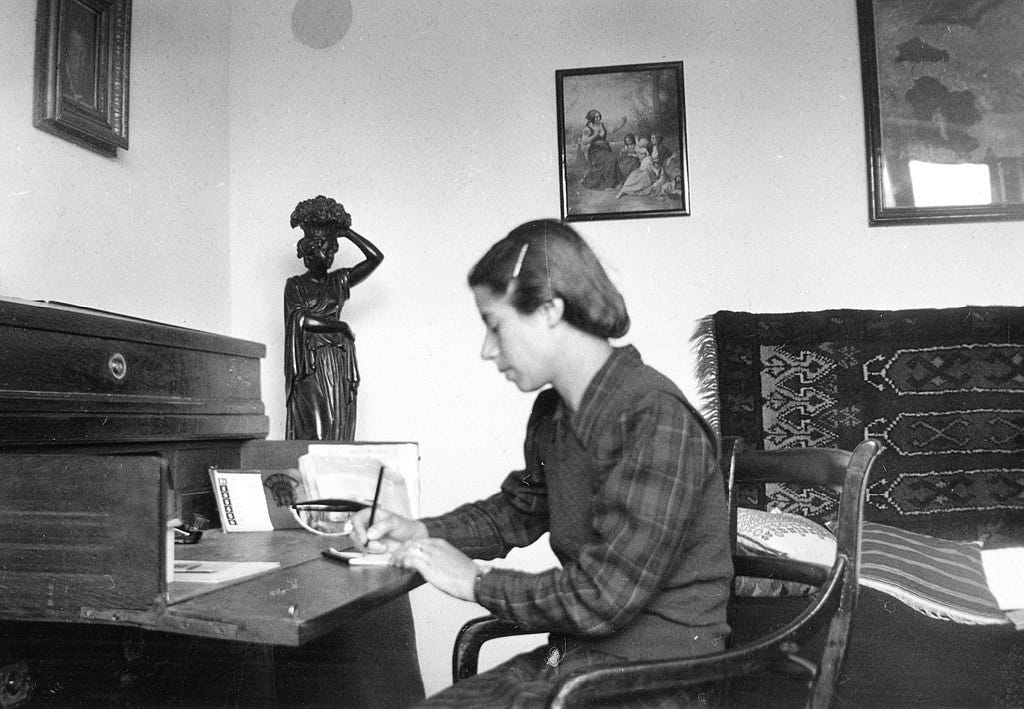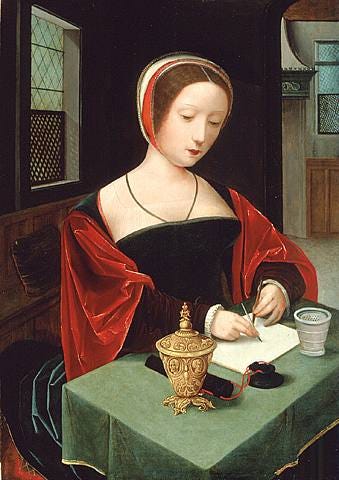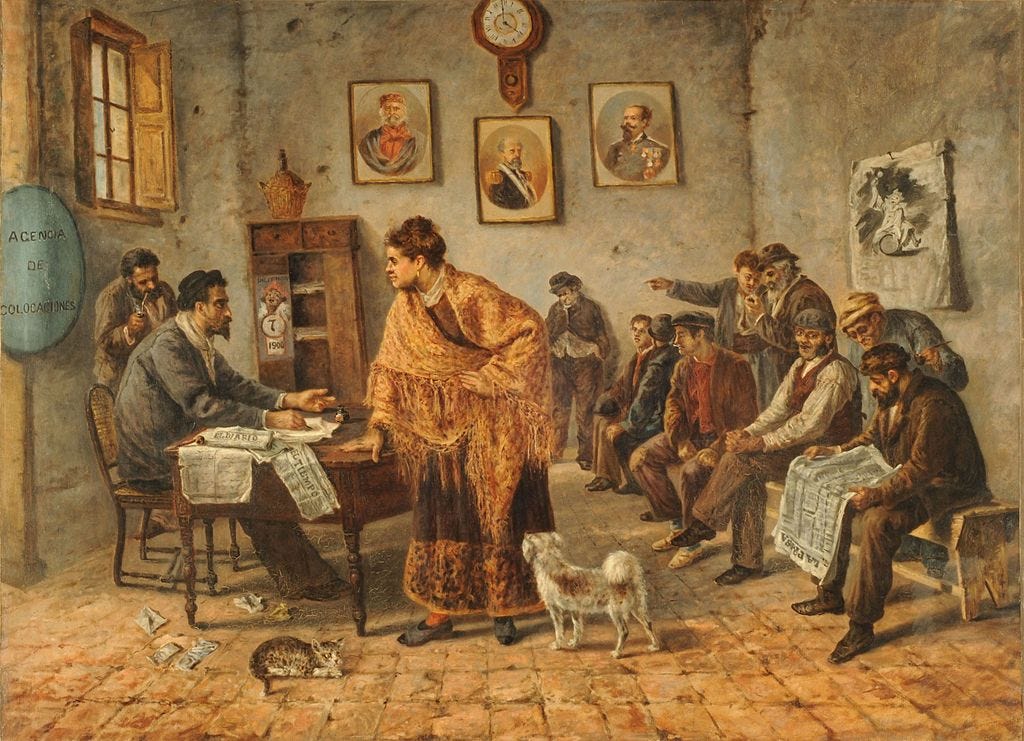The offices of the Ada Clarkson International Employment Bureau (“Promptitude—Courtesy—Intelligence”) are at the top of Shaftesbury Avenue, a little way past the Palace Theatre. Eve, closing the umbrella, which had prevented even a spot of rain falling on her hat, climbed the short stair leading to the door and tapped on the window marked “Enquiries.”
“Can I see Miss Clarkson?”
“What name, please?” responded Enquiries promptly and with intelligent courtesy.
“Miss Halliday.”
Brief interlude, involving business with speaking-tube.
“Will you go into the private office, please,” said Enquiries a moment later, in a voice which now added respect to the other advertised qualities, for she had had time to observe and digest the hat.
Eve passed in through the general waiting-room with[p. 63] its magazine-covered table, and tapped at the door beyond marked “Private.”
“Eve, dear!” exclaimed Miss Clarkson the moment she had entered, “I don’t know how to tell you, but I have been looking through my books and I have nothing, simply nothing. There is not a single place that you could possibly take. What is to be done?”
“That’s all right, Clarkie.”
“But . . .”
“I didn’t come to talk business. I came to ask after Cynthia. How is she?”
Miss Clarkson sighed.
“Poor child, she is still in a dreadful state, and no wonder. No news at all from her husband. He has simply deserted her.”
“Poor darling! Can’t I see her?”
“Not at present. I have persuaded her to go down to Brighton for a day or two. I think the sea air will pick her up. So much better than mooning about in a London hotel. She is leaving on the eleven o’clock train. I gave her your love, and she was most grateful that you should have remembered your old friendship and be sorry for her in her affliction.”
“Well, I can write to her. Where is she staying?”
“I don’t know her Brighton address, but no doubt the Cadogan Hotel would forward letters. I think she would be glad to hear from you, dear.”
Eve looked sadly at the framed testimonials which decorated the wall. She was not often melancholy, but it was such a beast of a day and all her friends seemed to be having such a bad time.
“Oh, Clarkie,” she said, “what a lot of trouble there is in the world!”
“Yes, yes!” sighed Miss Clarkson, a specialist on this subject.
“All the horses you back finish sixth and all the girls you like best come croppers. Poor little Phyllis! weren’t you sorry for her?”
“But her husband, surely, is most devoted?”
“Yes, but she’s frightfully hard up, and you remember how opulent she used to be at school. Of course, it must sound funny hearing me pitying people for having no money. But somehow other people’s hard-upness always seems so much worse than mine. Especially poor old Phyl’s, because she really isn’t fit to stand it. I’ve been used to being absolutely broke all my life. Poor dear father always seemed to be writing an article against time, with creditors scratching earnestly at the door.” Eve laughed, but her eyes were misty. “He was a brick, wasn’t he? I mean, sending me to a first-class school like Wayland House when he often hadn’t enough money to buy tobacco, poor angel. I expect he wasn’t always up to time with fees, was he?”
“Well, my dear, of course I was only an assistant mistress at Wayland House and had nothing to do with the financial side, but I did hear sometimes. . .”
“Poor darling father! Do you know, one of my earliest recollections—I couldn’t have been more than ten—is of a ring at the front-door bell and father diving like a seal under the sofa and poking his head out and imploring me in a hoarse voice to hold the fort. I went to the door and found an indignant man with a blue paper. I prattled so prettily and innocently that he not only went away quite contentedly but actually patted me on the head and gave me a penny. And when the door had shut father crawled out from under the sofa and gave me twopence, making threepence in all—a good morning’s work. I bought father a diamond ring with it at a shop down the street, I remember. At least I thought it was a diamond. They may have swindled me, for I was very young.”
“You have had a hard life, dear.”
“Yes, but hasn’t it been a lark! I’ve loved every minute of it. Besides, you can’t call me really one of the submerged tenth. Uncle Thomas left me a hundred and fifty pounds a year, and mercifully I’m not allowed to touch the capital. If only there were no hats or safety bets in the world, I should be smugly opulent. . . . But I mustn’t keep you any longer, Clarkie dear. I expect the waiting-room is full of dukes who want cooks and cooks who want dukes, all fidgeting and wondering how much longer you’re going to keep them. Good-bye, darling.”
And, having kissed Miss Clarkson fondly and straightened her hat, which the other’s motherly embrace had disarranged, Eve left the room
.
Thank you for reading Von’s Substack. I would love it if you commented! I love hearing from readers, especially critical comments. I would love to start more letter exchanges, so if there’s a subject you’re interested in, get writing and tag me!
Being ‘restacked’ and mentioned in ‘notes’ is very important for lesser-known stacks so… feel free! I’m semi-retired and write as a ministry (and for fun) so you don’t need to feel guilty you aren’t paying for anything, but if you enjoy my writing (even if you dramatically disagree with it), then restack, please! Or mention me in one of your own posts.
If I don’t write you back it is almost certain that I didn’t see it, so please feel free to comment and link to your post. Or if you just think I would be interested in your post!
If you get lost, check out my ‘Table of Contents’ which I try to keep up to date.
Thanks again, God Bless, Soli Deo gloria,
Von
Links
A bunch of fun and significant quotes:






